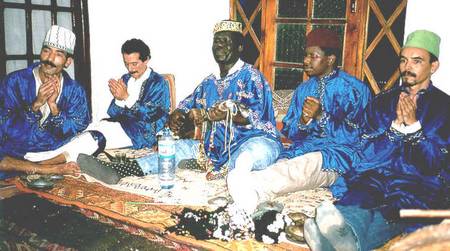Maâlem, MC, master of ceremonies…

this cassette rip is a double rescue – I dubbed it to digital before lending the tape to C, who briefly enjoyed the gnawa tape before getting robbed in El Parque de la Ciutadella by a quiet purse-snatcher.
the leader is Mahmoud Gania, one of the more famous members of a famous family of musicians in Essaouira, Morocco.
Ma̢lem Mahmoud Gania Рcassette side
The except is 18 minutes long. A big part of gnawa is how it sidesteps time… i still don’t know. 18, 30 minutes. 4 hours. Sundown to sunup. What do you call something that could almost always go on for longer? Songs have beginnings and ends. These are not songs.
Gnawa music has flourished in the Western imagination completely out-of-scale with its popularity in Morocco, partly because of the basslines which can be appreciated in a dubby/reggae context by Western ears, and partly because of its backstory — the music of African slaves in the Maghreb, colonial music in the truest sense, Afro-Arab, ritual sounds used to cure snakebites & heal & cast out ill spirits in all-night ceremonies, etc.
30 or 40 years ago gnawa was very much looked-down upon in Moroccan society. Nass el Ghiwane’s massive success did a lot to popularize the instrument and dislodge its poor/black/marginal stigma, in a Moroccan context… My bandmate Khalid tells of the difficulty in finding a guembri when he was young, then getting scolded by his mother for having any interest in the music at all.
This is very short-notice, but today is the last day the Film Society of Lincoln Center is showing Transes: a film by Ahmed El Maanouni about “The Rolling Stones of Africa”, that legendary Moroccan band–
http://www.filmlinc.com/wrt/onsale/musicdocs07.html#1
You probaby have seen this already. If you haven’t, last show’s tonight @ 8.30. I found a postcard of the event this afternoon at Hunter College’s Film & Media Studies Dept. office.
woah…! see you there?!
Absolutely!
Amazing music… thanks